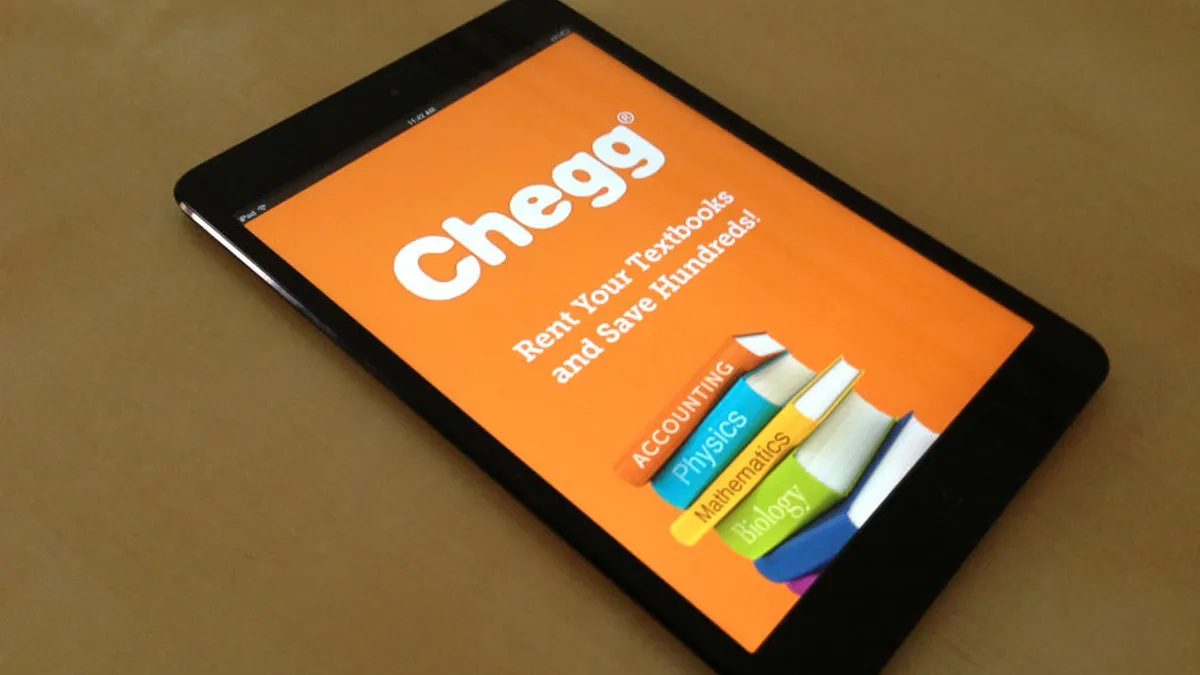The e-textbook movement stands to reshape instruction as new education technologies continue to fill classrooms via tablets and other mobile devices.
Meanwhile, the e-textbook market continues to evolve, and though many of the publishers' names have remained the same, new players have emerged, and old companies are adopting new strategies. Here are 16 names in e-textbooks that you should know about, as well as what each of them are doing to set themselves apart in a competitive new area of education:
1. KNO
(Publisher)
College e-textbook provider Kno expanded their market to the K-12 audience through a deal with Houghton Mifflin Harcourt, who previously offered K-12 social studies e-texts through the iPad. The books are rooted in Common Core standards, but aren’t state specific, and include 3D features, links, notes and videos. Kno’s books are available to rent for home study at $10 per title for iPad, web and Windows 7 readers, with Android support coming “soon.”
2. COURSESMART
(Marketplace/Platform)
CourseSmart—whose catalog includes over 30,000 e-textbooks from 40 publishers—announced a new e-textbook pilot program last year with Internet2 and Educause. Through the program, educational institutions can purchase license-based access to titles for a flat fee ($27,500 per semester for a 100-student license or $44,000 per semester for a 200-student license). Additionally, the company’s CourseSmart Analytics program, which was piloted at three colleges, uses an algorithm to compile and analyze various student usage metrics to provide professors an idea of their students’ engagement in the material. (To learn more, check out Education Dive’s interview with CourseSmart VP, Marketing Cindy Clarke.)
3. INKLING
(Platform)
Inkling is working with textbook publishers to create more interactive e-textbook content, with features including note taking, highlighting and quizzes. Students can additionally purchase content by the chapter, allowing them a full-content preview without the commitment of a full textbook purchase. The Inkling app is available for free through iTunes.
4. ELEVENLEARNING
(Platform)
Rather than offering texts from big publishers, ElevenLearning’s focus is oriented around offering crowd-sourced textbooks written by experts and edited and maintained by a community of educators and consumers. Though they only have four titles currently available, their model, if successful, could bring a disruptive change to the marketplace that would greatly benefit cash-strapped students.
5. MCGRAW-HILL
(Publisher)
Earlier this month, McGraw-Hill Education unveiled their new “SmartBooks” at the 2013 International Consumer Electronics Show in Las Vegas. The publisher’s latest addition to the e-textbook market will adapt to reader behavior by measuring factors such as retention and reading pace. By spring, around 90 SmartBooks should be available for $19.99 each. McGraw-Hill isn’t the only publishing giant to get in on adaptive learning, though, as Pearson and MacMillan both also have their own adaptive assessment tools.
6. MACMILLAN
(Publisher)
MacMillan’s “DynamicBooks” offer instructors the ability to rearrange, customize, combine and add their own materials to textbook content. Aside from allowing the textbook to perfectly match syllabi, DynamicBooks include interactive and multimedia features. Plus, they’re cheaper than paper textbooks and accessible via computer, iPhone, iPad and other tablet devices.
7. ELSEVIER
(Publisher)
Elsevier announced last fall that it would make a free, non-downloadable version of one of its e-textbooks available to students in edX’s Circuits & Electronics MOOC. Originally offered as a free download the previous fall, the publishing giant found that providing only a “static,” non-downloadable PNG version increased sales of the text. As part of the arrangement, the syllabus for the course links to Elsevier’s website, where discounted copies of the print and full electronic editions can then be purchased.
8. PEARSON
(Publisher)
In December, Pearson received top honors in the 2012 “Tech & Learning” Awards of excellence for three of its iBooks Textbooks. The texts—Pearson Algebra I Common Core Edition, Pearson Geometry Common Core Edition and Miller & Levine Biology—are part of an e-textbook suite launched in January 2012 that feature content enhanced with video, audio, assessments, interactive images and 3D animations. The honors additionally allowed the publisher to lead the award program for the third consecutive year.
9. CHEGG
(Platform/Marketplace)
Silicon Valley start-up Chegg—which launched in 2007 as a textbook rental company—offers its own e-textbook reader. Compatible with all connected devices, the reader allows students to search, highlight, take notes and see other students’ highlights. The eReader also allows round-the-clock access to Chegg’s Homework Help Q&A, as well as 7-day access to an e-textbook if you ordered a physical edition.
10. NOOK STUDY (BARNES & NOBLE)
(Platform)
Barnes & Noble offers a free NOOK Study app for PC and Mac computers. The app allows users to search, highlight, tag and link, as well as access course handouts. It also offers free 7-day trials of e-textbooks.
11. OPENSTAX
(Publisher)
OpenStax--a nonprofit, open-access publisher operating out of Rice University—announced in December that it would begin offering a paid version of its free, online College Physics text. Available through iTunes as an iBook for $4.99, it features extras like videos, interactive graphics, quizzes and demonstrations. As of December, the company has funding for eight textbooks with fundraising in the works for 17 more, and plans to expand to more platforms.
12. APPLE E-TEXTBOOKS
(Platform)
Just over a year ago, Apple announced its entrance into the crowded e-textbook market, with a build-your-own-textbook tool sticking out in particular. With iBooks Author, professors can add images from their iPhoto libraries, iTunes video clips, and Keynote lecture slides—though the program runs only on Macs, meaning professors and students would have to adopt Apple products. Also announced at the event, iTunesU—a course-management system alternative—was seen as being more likely to be widely adopted.
13. INGRAM/VITALSOURCE BOOKSHELF
(Platform/Marketplace)
Ingram’s VitalSource touts its Bookshelf app as the “preferred and most used e-textbook delivery platform in the world of higher education.” With content from more than 200 top academic publishers available via laptop, desktop, or mobile device and a partnership with Blackboard Learn, it’s a hard point to argue. In December, 35,000 new digital textbooks and course materials were added to the platform. The app is free, as are a selection of sample texts.
14. TUATARA'S GILAPAD
(Platform)
Northeastern graphic design graduate Xavier Xicay and William Hoover, a McGraw-Hill digital author and Bunker Hill Community College anatomy professor, founded Tuatara with one goal in mind—disrupting the existing higher education model. The company’s web-based e-book platform, GilaPad, has already attracted publishers like McGraw-Hill, Pearson, Wiley and Jones & Bartlett, and launched in a closed beta this past fall. Prior to the beta, the platform was tested with 100 professors and over 1,000 students at MIT, Bunker Hill and other Boston-area colleges. Tuatara are currently seeking $6 to 8 million in funding, and Xicay says publishers have also shown interest in owning part of the company.
15. AMAZON/KINDLE
(Platform/Marketplace)
With Amazon’s Kindle e-textbooks, the company promises savings of up to 60% for buyers and 80% for renters compared to the print edition’s list price. Available on Kindle Fire—and via the Kindle app for iPad, Android tablets, PC and Mac—Kindle’s e-textbooks offer instant access to a books most important information with glossary definitions and relevant page links via the platform’s Xray feature. The feature also links to related content from Wikipedia and YouTube and is available on most of the platform’s most popular textbooks. Kindle’s “Whispersync” technology also synchronizes bookmarks, notes and highlights across devices.
16. KORTEXT
(Platform)
Kortext, a digital textbook platform based in the United Kingdom, launched last year in partnership with John Smith’s, a UK campus retail company, and Aspire, JS Group’s bursary management system. Partner publishers from around the world include Pearson, Wiley, McGraw-Hill, Taylor & Francis, Palgrave and Oxford University Press. Additionally, the University of East London and Regents College have already made deals with the company to provide its platform—which is available on most devices—to more than 2,000 students.
Would you like to see more education news like this in your inbox on a daily basis? Subscribe to our Education Dive email newsletter! You may also want to read Education Dive's look at the top 10 online bachelor's degree programs.






















